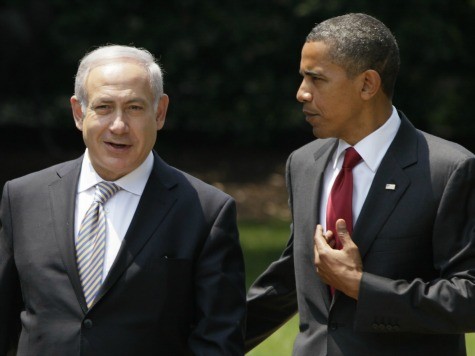Israeli Prime Minister Binyamin Netanyahu met in the Oval Office on Monday with U.S. President Barack Obama, deflecting Obama’s veiled threats of isolation if the Jewish State did not quickly agree to a peace framework with the Palestinians.
Just a day earlier, Bloomberg News reported that Obama made several statements critical of Netanyahu and his policies, placing the onus for peace on Israel. He warned Israel that America’s ability to “manage the international fallout is going to be limited” if Israel did not agree soon to an Obama-brokered deal with the Palestinian Authority.
Obama’s confrontational statements were released just as Netanyahu was leaving Israel for what had been anticipated to be an unpressured White house meeting, focusing largely on developments in Iran and Ukraine.
Netanyahu chose to avoid additional confrontation with Obama, instead focusing attention on the failure of the Palestinians to indicate any flexibility on any key issues. “Israel has been doing its part, and I regret to say that the Palestinians haven’t,” Netanyahu said to Obama, in front of the press. “The people of Israel know that it’s the case.”
“What we want is peace – not a piece of paper,” he said.
Netanyahu called for a “real peace… based on mutual recognition,” and called out his Palestinian counterparts for promoting “incessant violence” against the Jewish state. Anti-Israel incitement sponsored by the Palestinian Authority has not abated even during the Israeli-Palestinian peace negotiations.
“Israel, the Jewish state, is the realization of the Jewish people’s right to self-determination,” Netanyahu said. “I think it’s about time they recognized a nation state for the Jewish people. We’ve only been here for about 4,000 years.”
Netanyahu is the first Israeli prime minister to formally call on the Palestinians to recognize Israel as a Jewish state, which he has called a “minimal requirement” for peace.
Such recognition of a Jewish nation-state would implicitly end additional Palestinian claims for Israeli territory or the “right of return” to Israel of some 5 million descendants of refugees from 1948. The Palestinian leadership refuses to consider such recognition.
“The only peace that will endure is a peace that we can defend,” he added, highlighting his insistence that any borders with a Palestinian entity Israel agrees to must be defensible.
The Palestinians insist that they be given a state covering all land outside the 1949 Armistice lines, which would leave Israel in places only nine miles (15 kilometres) wide.

COMMENTS
Please let us know if you're having issues with commenting.